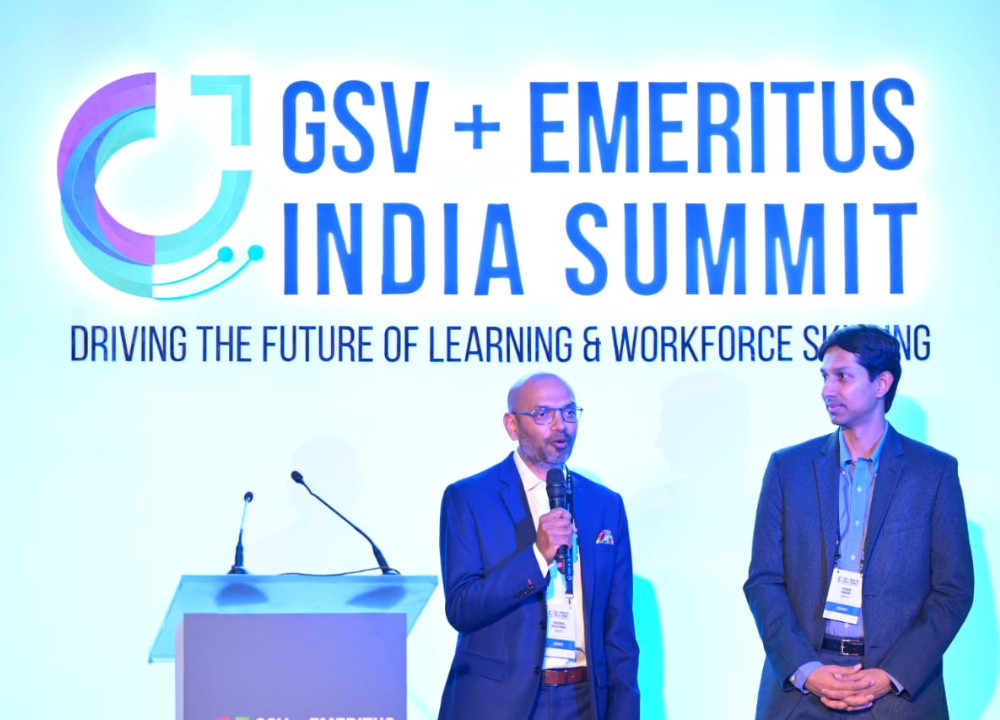How Upskilling Can Help Your Career Thrive: Insights From Leaders at the GSV Summit

In the dynamic landscape of today’s rapidly evolving world, professionals and organizations find themselves facing a critical challenge: the skill gap. With technological advancements and market dynamics constantly reshaping industries, the disparity between professionals’ current skills and the ones demanded by their jobs can have profound consequences. For organizations, it manifests as a lack of innovation decreased productivity, and higher turnover rates. Meanwhile, professionals encounter restricted opportunities for advancement, unemployment or underemployment, and mounting pressure. The need to bridge this skill gap has never been more urgent. To address this effectively, therefore, requires proactive measures and a commitment to upscaling and upskilling.
Amidst the disruptive forces that redefine industries, strategic upskilling has emerged as a beacon of hope. Moreover, with certain skills and roles becoming obsolete—while others remain scarce—organizations and professionals must adapt to thrive. Thus, the key lies in empowering professionals to acquire the necessary expertise and fulfill the evolving demands of their roles.
This was exactly the topic under discussion at the “Upscaling Upskilling” panel on Day 3 of the GSV+Emeritus India Summit, where global leaders converged to share their insights on the skill gap.
Here are some of the key insights from the best minds in the business on the skill gap phenomenon. Furthermore, we will uncover innovative solutions and practical insights to navigate this dynamic landscape successfully.
The Need for Upskilling to Remove the Skill Gap

As AI technologies rapidly advance and reshape industries, the way we work undergoes significant changes. Today’s increasingly sophisticated AI systems possess the capability to automate routine tasks and even make complex decisions. This transformative shift in technology has direct implications for the skills demanded in the workforce. While AI can automate specific tasks, it also opens up new opportunities. In addition to this, it creates a need for human skills that can complement and interact with AI systems.
Joybroto Ganguly, Founder of Antwalk, affirms this pivotal role of AI in their organization. With over 80% of his team utilizing AI tools, they streamline and automate simple and medium tasks. By integrating AI tools, his team can focus more on intricate tasks requiring human expertise. This showcases the significance of upskilling professionals to foster effective collaboration with AI technologies. By developing skills that complement the capabilities of AI, individuals can work alongside AI systems, optimizing productivity and efficiency. Therefore, to adapt to the evolving landscape shaped by AI, upskilling has become highly essential. Moreover, upskilling enables professionals to seize the opportunities presented by AI and ensure they remain competitive in an AI-driven world.
Demands of the Modern Job Market
Traditional education, while valuable in providing foundational knowledge, often falls short in preparing professionals for the complex modern job market. TC Haldi, Senior Director of MIT, highlights that they go beyond technical aspects and include leadership solutions for engineers. The emerging trend is that engineers are increasingly called upon to assume leadership roles and think at an organizational level. However, despite their educational background, most professionals lack the necessary skills for leading teams and thinking strategically.
Haldi further explains that MIT has focused on developing application-based programs in response to this skill gap. Such application-focused programs can equip professionals with skills that align with their roles and prepare them to tackle complex work challenges. Furthermore, the emphasis is placed on practical learning and application, moving beyond solely theoretical knowledge. This successful approach has gained recognition within the field, with Haldi emphasizing the growing demand for upskilling globally. “We’ve all discussed the statistics indicating the need to upscale one in five people in the next four years. However, I believe the numbers are even greater than that. The market demand for upskilling is growing, and the need is evident worldwide,” she explains.
To ensure professionals are adequately prepared for their roles, it is crucial to complement traditional education with upskilling programs. Furthermore, with such practical and application-focused programs, professionals can excel in leadership roles and think strategically. This benefits learners by enhancing their career prospects and contributes to the overall success of organizations. Additionally, recognizing the limitations of traditional education and embracing upskilling initiatives can help professionals bridge the gap between current skills and the evolving demands of the job market. This ultimately helps them thrive in their careers.
Finding Innovative Solutions to Address the Skill Gap
Effective communication is crucial in a globalized and interconnected world where professionals from diverse backgrounds collaborate and work together. However, language differences can hinder the transfer of knowledge and skills, impeding the upskilling process. According to Mohammed Hisamuddin, Founder and CEO of Entri, to address the skill gap, we need to also address language barriers. Language barriers can limit an individual’s access to learning resources, networking opportunities, and collaboration with experts in their field.
Moreover, he believes that this shift in mindset would greatly benefit the Indian ecosystem as a whole. He expresses the wish that more individuals would have the belief and confidence that even if they are not proficient in English, they can still upskill in their own language and secure job opportunities. By recognizing the value of upskilling in one’s native language, individuals can overcome language limitations and access the necessary opportunities. This inclusive approach would open doors for a larger pool of talent to enhance their skills. In addition to this, it can also contribute to the workforce, ultimately driving the growth of the Indian economy.
Joybroto Ganguly highlights an innovative solution to tackle the skill gap, emphasizing the power of the creator economy. Ganguly firmly believes in the concept of learning from individuals who have already gained expertise in a particular field. In his view, universities and other institutions are composed of numerous experienced individuals with valuable knowledge that can be shared. Furthermore, he believes that the intersection of upskilling and creator economy will become a prominent trend in 2023 and beyond.
Technical and Soft Skills for Success

As industries evolve and job requirements shift, employers increasingly value candidates with updated and relevant skill sets. Furthermore, upskilling can help professionals acquire the latest knowledge and develop in-demand skills that align with the needs of the market. Furthermore, soft and technical skills play vital roles in today’s professional landscape.
Ayush Jaiswal, co-founder and CEO of Pesto Tech, emphasizes the significance of soft skills as valuable abilities in the workplace. According to Jaiswal, even if they are not technical in nature, soft skills should not be overlooked. Effective communication, for instance, greatly enhances an individual’s work performance. Furthermore, it directly correlates with employability as the impact a person can create within a company is amplified.
Jaiswal advocates for giving equal importance to soft skills alongside technical skills. Individuals can become more productive and increase their employability by prioritizing and honing these skills. Jaiswal also questions why soft skills are not already incorporated into educational curricula, highlighting the need to address this gap. Taking soft skills seriously, just like technical skills, is crucial in developing well-rounded professionals who can contribute effectively in the workplace. Ultimately, the combination of technical and soft skills is what truly enhances an individual’s productivity.
ALSO READ: GSV Emeritus India Summit Day 2: It’s India’s Century to Innovate in Education
Finding the Best Platform to Bridge the Skill Gap
In conclusion, the “Upscaling Upskilling” panel at GSV+Emeritus India Summit offered valuable insights to address the skill gap. Furthermore, it is evident that both technical and soft skills play a crucial role in the success of professionals. By acquiring a balance of these skills, individuals can enhance their career prospects and make meaningful contributions to their organizations. If you are looking to upskill, consider exploring the diverse online courses offered by Emeritus India in collaboration with top universities worldwide. Stay proactive in adapting to the ever-evolving demands of the professional world and position yourself for success.
By Krati Joshi
Write to us at content@emeritus.org





